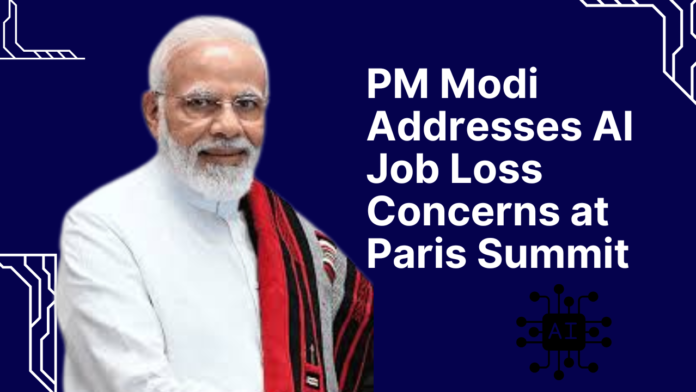Easing concerns that artificial intelligence (AI) will lead to mass job losses, Prime Minister Narendra Modi, speaking at the AI Action Summit in Paris, emphasized that technological advancements do not eliminate jobs but transform them. He reassured global leaders, stating:
“Job loss is AI’s most feared disruption, but history has shown that work does not disappear with technology—only its nature changes. Thus, we must invest in skilling and reskilling our people for an AI-driven future.”
For years, concerns have mounted over AI’s potential to replace millions of jobs across industries. While automation may disrupt certain roles, PM Modi stressed that employment opportunities evolve rather than vanish. To navigate this transition, he urged governments worldwide to prioritize workforce upskilling and reskilling programs, ensuring people are prepared for AI-driven industries.
AI’s Impact and Global Governance
Co-chairing the AI Action Summit at the invitation of French President Emmanuel Macron, PM Modi outlined a comprehensive vision for AI governance. He underscored AI’s profound influence on governance, economies, security, and society, stating:
“AI is reshaping our polity, economy, security, and even our society. It is writing the code for humanity in this century. However, unlike previous technological milestones, AI’s impact is far more profound and far-reaching.”
Highlighting AI’s rapid global adoption, he called for a collective approach to governance that balances innovation with risk management.
“Governance is not just about mitigating risks and rivalries—it is also about fostering innovation for the global good. We must engage in open discussions on AI’s role in society and ensure its development benefits all.”
He also pointed to disparities in AI accessibility, particularly in the Global South, where limited computing power, talent, and financial resources hinder progress.
“AI can transform millions of lives by improving healthcare, education, agriculture, and much more. It can accelerate progress toward Sustainable Development Goals (SDGs) and bridge societal gaps.”
Democratizing AI and Addressing Emerging Threats
PM Modi emphasized that AI governance should prioritize inclusivity and accessibility. He advocated for open-source AI models, unbiased high-quality datasets, and transparent systems that empower individuals and startups.
“We must develop open-source AI systems that foster trust and transparency. Technology must be rooted in local ecosystems to be effective and useful.”
He also addressed pressing concerns surrounding cybersecurity, misinformation, and deepfakes. With growing risks of external interference in domestic affairs via digital platforms, he stressed the need for responsible AI deployment.
The Emergence of Sustainable AI
Discussing AI’s future, PM Modi highlighted the importance of sustainability, extending beyond energy-efficient computing to scalable, resource-conscious AI development. The recent breakthroughs in AI models like DeepSeek, optimize performance while operating on minimal power.
“AI can be efficient and sustainable. We must collaborate globally to build AI models that are not only powerful but also resource-conscious, ensuring equitable access to technology.”
To achieve this, he called for greater international cooperation in developing ethical AI frameworks and equitable data-sharing mechanisms.
The summit underscored a shared vision and purpose among stakeholders in shaping the future of AI. As a result, a decision was made to establish the “AI Foundation” and the “Council for Sustainable AI”—initiatives proposed by French President Emmanuel Macron. Prime Minister Modi pledged India’s full support for these efforts while advocating for a “Global Partnership for AI” that is truly inclusive, particularly addressing the priorities, concerns, and needs of the Global South. To sustain the momentum of the AI Action Summit, India has offered to host the next edition.
India’s Leadership in AI Development
India is actively building AI applications for the public good, supported by one of the world’s largest AI talent pools. The country is developing its own Large Language Model (LLM) to address its linguistic and cultural diversity, fostering a public-private partnership model that ensures accessibility for startups and researchers.
“India has been at the forefront of sharing its technological advancements with the world—be it COVID vaccines, the UPI payment system, or space technology. We remain committed to democratizing AI for global benefit.”
As the world stands at the dawn of the AI age, PM Modi reaffirmed that humanity’s future remains in its own hands:
“The key to humankind’s collective future and shared destiny lies with us—not with AI.”




